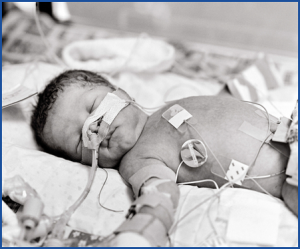Birth Injuries

HSSH has successfully handled many birth injury cases. These cases involve some of the most devastating consequences for our clients. We recognize that while no amount of money can adequately compensate for the permanent injury of a child, the future care and comfort of that child can cost millions of dollars. Statistics show that approximately 27 of every 1,000 births in the United States results in a birth injury. A “birth injury” is defined as any type of damage to an infant’s body before, during or just after birth. Birth defects can cause death, or mental and physical impairment. While a birth defect may be genetic in origin, it can also occur as a result of a mother’s exposure to chemicals, disease, and environmental toxins while the baby is developing in utero.
Complications in the process of labor and delivery can result in a wide variety of problems for a newborn baby. These problems can be mild or severe. One major cause is oxygen deprivation, which commonly occurs when the umbilical cord is compressed or twisted in the birth process. The other main cause is mechanical trauma, which may occur when the baby assumes an unusual position at the time of birth (buttocks rather than head first, for example) or when the baby is too large to pass through the birth canal easily.
Doctors and health care professionals must exercise the utmost care to avoid injury to babies during the especially vulnerable times of labor induction, Cesarean section, and mechanically assisted (forceps) births. Babies who experience severe oxygen deprivation to the brain, or head trauma, during these delicate obstetrical procedures often die or face disabilities. Approximately 10,000 babies each year develop cerebral palsy (a condition which impacts the ability to control movement) as a result of oxygen deprivation. Oxygen shortage also causes hypoxic-ischemic brain damage. Other types of traumatic obstetric birth injuries include prenatal asphyxia, Erbs Palsy or Brachial Plexus Palsy, Klumpke’s Palsy, Torticollis, and Shoulder Dystocia. Fractures, spinal cord trauma, cephalohematoma and intracranial hemorrhage may be the result of preventable obstetrical damage. Medical providers may be held liable for:
- Failing to react to and treat difficult or prolonged labor (often due to a large baby)
- Failing to detect the umbilical cord wrapped around a baby’s neck
- Unreasonable delay in performing an emergency Cesarean section
- Failure to test and treat conditions during pregnancy, or misdiagnosis
- Failing to recognize signs of fetal distress
- Applying excessive force to the baby during delivery
- Failing to anticipate possible complications which may arise based upon the size or position of the child
- Using prescription medications that can cause birth defects such as Accutane, Crestor, Cytotec, Lexapro, Paxil, Soriatane, and Terbutaline
It is also important to keep in mind that even if the statute of limitations may have passed for the parents, in most states the child has an extended period in which to file a claim. That said, you should pursue a claim on your child’s behalf as soon as possible.
HSSH has experienced birth injury attorneys and would be happy to discuss your claim with you. The consultation is free and if we do not make a recovery on your behalf, you owe us nothing.
If your child has suffered a birth injury and you would like to discuss your case with us please call us at 800-753-5359 or 806-376-8903 (Texas office) or 303-333-2200 (Colorado office) or contact us here. The consultation is free and if we do not make a recovery, you owe us nothing.
To learn more about medical malpractice contact us at 800-753-8903 or click the link below to request a copy of: “HOW TO RECOGNIZE MALPRACTICE”
Find out why most medical malpractice victims never recover for their injuries and what you can do to help your chances of recovery.


 Español
Español






100% Free Consultations - Se Habla Español
806-376-8903 | 800-753-5359